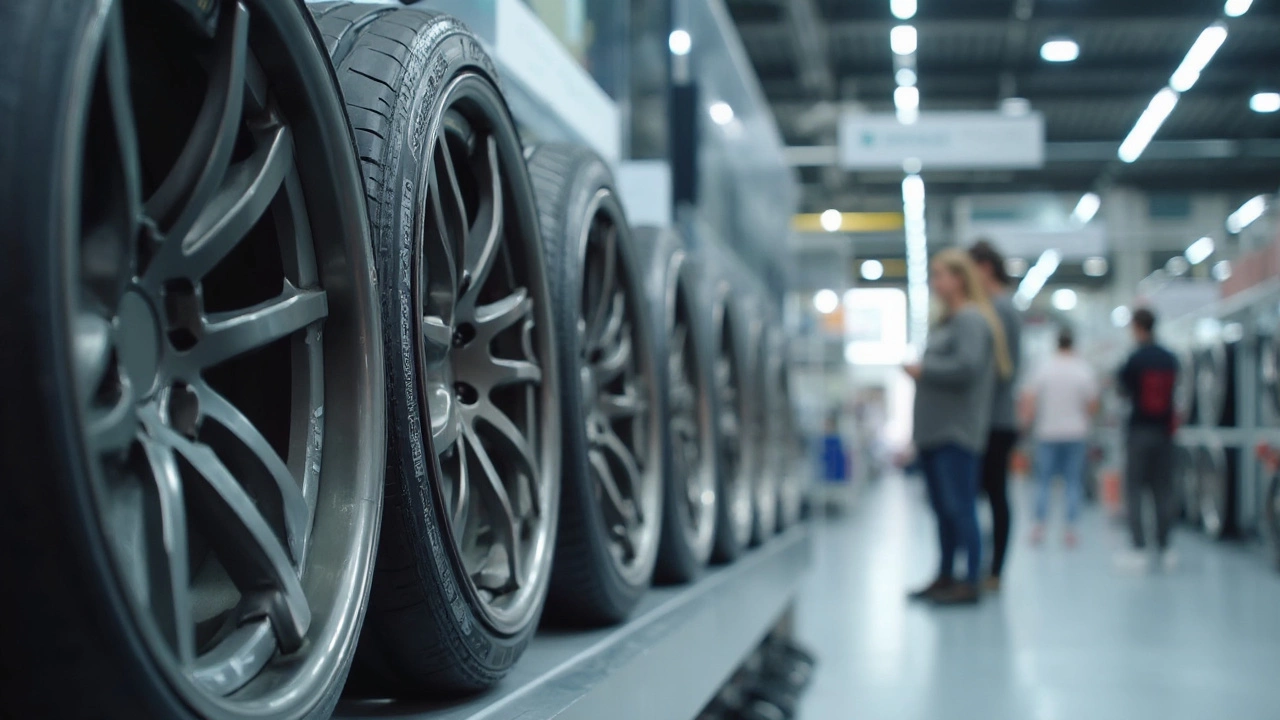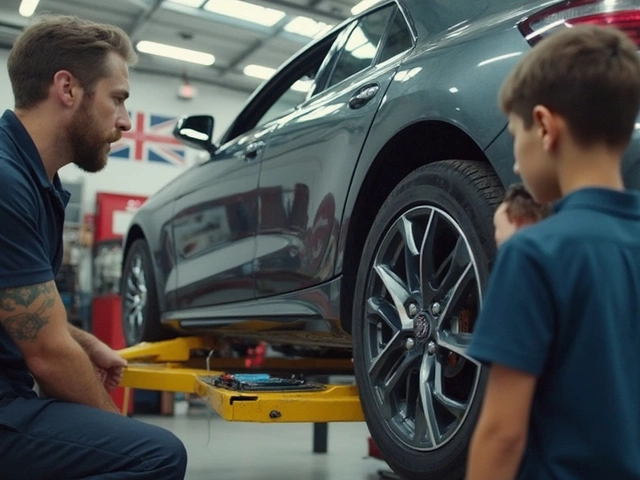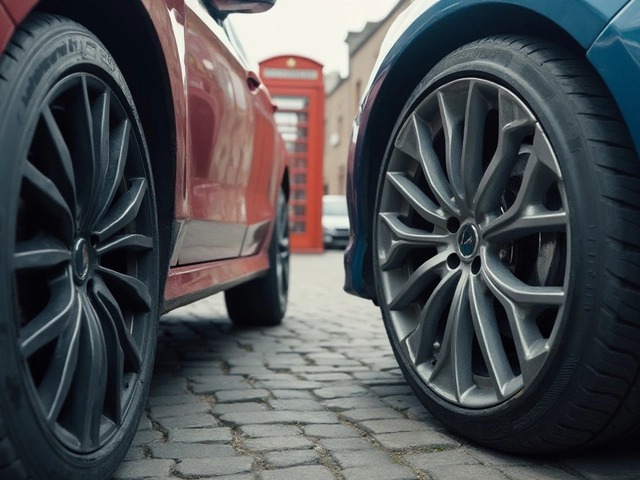If you walk onto a dealership lot or flip through a car brochure, you’ll see the term “alloy wheels” tossed around like everyone’s supposed to know exactly what it means. Here’s the thing: “alloy” just means a mix of metals, but not every alloy is aluminum. That’s where people often get tripped up.
Most drivers just assume alloy wheels are always aluminum wheels, but that’s not the whole story. Some alloys use other metals, like magnesium, or even a blend. Why should you care? Because the type of metal affects how your wheels look, how they perform, and even how much your wallet feels the hit when you buy or repair them.
Let’s clear up the confusion so you don’t pick your next set of wheels based on a label that doesn’t tell the full story. You want the right combo of style, strength, and cost for your ride. It starts by knowing exactly what “alloy wheels” really means for car owners like you.
- What Exactly Are Alloy Wheels?
- The Truth About Aluminum Wheels
- Differences That Matter for Drivers
- Pros and Cons: Alloy vs. Other Wheels
- Tips for Choosing the Right Wheels
What Exactly Are Alloy Wheels?
It sounds fancy, but alloy wheels are just wheels made from a blend of metals—usually aluminum mixed with things like nickel or magnesium. The whole point of this mix is to get better strength, less weight, and sometimes a cooler look compared to old-school steel wheels.
The big thing that sets alloys apart isn’t just what they’re made of, but how they perform. By blending metals, wheel makers get solid, durable rims that don’t weigh your car down. That lighter weight makes a real difference—better handling, quicker stops, and even a small bump in fuel mileage for most drivers. You’ll also notice that alloy wheels are almost always shinier and sportier than plain steel ones.
Here’s what usually ends up in an alloy wheel mix:
- Aluminum: The most common base, known for being light and easy to shape.
- Magnesium: Sometimes used for even lighter, performance-focused wheels (think racing).
- Other metals: Trace bits of copper or nickel added for extra strength or resistance to corrosion.
How do they make them? Most get cast (poured into a mold, kind of like making a cake) or forged (basically hammered and pressed under crazy pressure). Forged wheels cost more, but they pack better strength for their weight.
For comparison, check out this quick breakdown:
| Type | Typical Weight (16" Wheel) | Common Materials | Market Use |
|---|---|---|---|
| Alloy | 7–10 kg | Aluminum, sometimes Magnesium | Most modern cars, sports cars |
| Steel | 11–15 kg | Steel | Budget cars, winter wheels |
| Magnesium (Mag) | 5–8 kg | Magnesium | High-end or race cars |
The fact is, alloy wheels are now standard on most new cars, but not all alloys are alike. The metals blended—and how they’re made—change things like cost, durability, and even how often you’ll have to clean off brake dust. Knowing what goes into your wheels helps you ask for what you want, not just what’s popular at the shop.
The Truth About Aluminum Wheels
When most people talk about alloy wheels, what they really mean are aluminum wheels. Aluminum is the main ingredient in these wheels, usually mixed with a little bit of other stuff like nickel to make them tougher. But aluminum isn't just a random pick—there's a good reason why car makers and drivers love it.
Aluminum wheels are lighter than old-school steel wheels, and that lightness actually makes a difference. Less weight means your car uses less gas and handles better, especially when you turn or stop. Not bad for something people usually pick because it looks cool.
Here’s a quick breakdown of how aluminum wheels stack up against steel:
| Feature | Aluminum Wheels | Steel Wheels |
|---|---|---|
| Weight | Light | Heavy |
| Looks | Shiny, customizable | Basic, less stylish |
| Corrosion Resistance | Resists rust, but can pit | Rusts over time |
| Price | More expensive | Usually cheaper |
| Performance | Better acceleration and braking | More sluggish |
Now, not every alloy is aluminum. There are magnesium alloys out there, but those are way less common and usually reserved for fancy sports cars or racing. For everybody else, if you're buying "alloy wheels," they're almost always aluminum wheels.
One fun fact: Car techs call aluminum wheels “cast” or “forged” based on how they’re made. Cast wheels are poured into a mold, which keeps prices reasonable. Forged wheels are squeezed under pressure for extra strength, but you’ll pay a premium. For most daily drivers, cast aluminum wheels work just fine, unless you hit potholes the size of craters every day.
If you care about fuel economy, smoother rides, or just want your ride to look sharp, aluminum should be on your radar. They’re not just about looks—they’re about smarter driving too.

Differences That Matter for Drivers
The kind of wheels your car rolls on isn’t just about looks. The material—especially whether your wheels are aluminum or some other alloy—has a real impact on how your vehicle handles, how much you’ll spend over time, and even how safe you are.
Let’s break down the facts. Alloy wheels are meant to be lighter than steel, which means you get better acceleration and braking because there’s less weight for your car to move. But when you talk about "alloy," most of the time, it’s aluminum alloys you’re dealing with—usually a mix of aluminum and a bit of another metal like magnesium. That combo helps keep wheels strong but still light.
- Weight: Lighter wheels mean easier steering and a comfier ride over bumps. A standard aluminum alloy wheel can be up to 35% lighter than a steel wheel of the same size.
- Fuel Economy: Less unsprung weight (that’s the stuff not supported by the suspension, like wheels) means the engine doesn’t have to work as hard, and you might see a small boost in your miles per gallon.
- Durability: Aluminum alloys resist rust, but they are more likely to bend or crack compared to steel if you hit a big pothole. Magnesium alloys are even lighter but can be pricier and sometimes less durable in winter conditions.
- Maintenance: Alloy wheels are easy to clean but can get scuffed or scratched, and curb rash is a real issue if you aren’t careful parking. Polished finishes look great but need more upkeep to stay shiny.
- Price: Expect to pay more for alloy wheels compared to basic steel ones. Price depends on design, size, and metal blend. Aftermarket designs can get expensive fast, especially if you want custom looks.
Wondering how these differences really stack up? Here’s a quick data snapshot comparing aluminum alloy, magnesium alloy, and steel wheels:
| Wheel Type | Avg. Weight (17”) | Rust Resistant | Avg. Cost (per wheel) | Common Use |
|---|---|---|---|---|
| Aluminum Alloy | 20 lbs | Yes | $120–$250 | Everyday/Performance |
| Magnesium Alloy | 16 lbs | Yes | $250–$700 | Motorsport/Luxury |
| Steel | 28 lbs | No | $50–$100 | Base/Spare |
For daily driving, aluminum alloy wheels hit a sweet spot: lighter, less likely to rust, and easier on the eyes. Just pay attention to road conditions—if you’re somewhere with rough roads or brutal winters, you’ll want to balance looks and performance against how much punishment your rims can take. That’s where knowing the real differences pays off.
Pros and Cons: Alloy vs. Other Wheels
Before you drop cash on a set of wheels, it’s worth knowing what you’re really getting compared to the traditional alternatives. Let’s break down why alloy wheels (especially aluminum types) are a go-to choice, but also where they might fall short compared to steel or older magnesium wheels.
- Lighter weight: Alloys usually weigh less than steel wheels. That means better acceleration, quicker stopping, and in some cases, slightly better gas mileage. If you’re picky about how your ride handles, you’ll notice the difference.
- Looks matter: Alloy wheels are way easier to shape and finish. You get all sorts of designs, fancy spokes, and even different colors. Steel wheels? Not so much—they’re made for utility.
- Corrosion resistance: Aluminum alloys aren’t as likely to rust. Steel wheels, especially in places that use road salt, can get ugly fast.
- Brake cooling: The way alloys are made lets them cool brakes better. That's a nice bonus if you do lots of stop-and-go driving or push your car hard.
BUT, there are some tradeoffs you’ll want to think about:
- Price: Alloys nearly always cost more. The manufacturing process is more involved, and the designs bump up the price. Steel is basic, but your wallet will thank you.
- Toughness: Steel wheels can take a beating—think potholes and rough roads. Alloys can bend or crack if hit really hard and usually can’t be hammered back into shape. That means a replacement, not a repair.
- Winter performance: Steel wheels handle road salt and winter muck pretty well despite rusting, while alloys can pit over time if the clear coat gets damaged. Some drivers run steel wheels for winter and switch to alloys in spring.
| Type | Weight | Looks | Cost | Durability |
|---|---|---|---|---|
| Alloy (Aluminum) | Light | Stylish, custom options | $$ | Good, but can crack |
| Steel | Heavy | Basic designs | $ | Very tough, dents fixable |
| Magnesium Alloy | Lightest | Rare, racing style | $$$ | Prone to corrosion, expensive |
Here’s a simple tip: if you want a sharp look and better handling, grab alloys. If you’re driving where potholes are everywhere or want a backup for winter, steel makes more sense. And unless you’re racing, magnesium is probably overkill for most people.

Tips for Choosing the Right Wheels
Picking new wheels isn’t just about looks. You’ve got to think about how they’ll handle, what they’ll cost you in the long run, and whether your car can even use them safely. Here are a few steps to keep things easy and smart when you’re out wheel shopping.
- Alloy wheels offer a good mix of strength and weight, but all alloys aren’t created equal. Check if you’re getting aluminum-only or a blend like aluminum-magnesium. Aluminum ones are more popular because they’re lighter, rust-resistant, and handle potholes better than steel.
- Think about your local roads. If you drive where potholes or speed bumps are common, lighter wheels like aluminum alloys help with shock absorption and save wear on your suspension.
- Maintenance matters. Aluminum finishes stand up to winter salt and rain better than most magnesium or steel wheels. But if you’re after the shiniest look, make sure to wash often. Brake dust can eat into the finish if left too long.
- Size makes a difference. Bigger wheels usually look flashier, but can make the ride stiffer and eat up more gas. Stick close to your car’s factory size unless you like feeling every bump.
- Don’t ignore load rating and bolt pattern. If those numbers don’t match your car, you could end up with vibrations, steering weirdness, or safety risks. Always check the wheel’s specs before buying.
| Material | Weight | Corrosion Resistance | Common Use | Price Range |
|---|---|---|---|---|
| Aluminum Alloy | Light | High | Most modern cars | $$ |
| Steel | Heavy | Moderate | Base-model cars, winter use | $ |
| Magnesium Alloy | Very light | Low | High-performance, racing | $$$ |
Here’s a solid tip: If you’re buying used, check for cracks, bent rims, or pitting. Wheels with hidden damage can mess with your car’s balance or even fail on the road. Also, make sure your tire pressure sensors will fit the new wheels if your car needs them.
Wrapping up—think about where you drive, what you want your car to do, and how much work you’re willing to put into keeping your wheels looking good. When in doubt, talk to a local tire shop with a good reputation. They’ve seen it all and can point you to the best choice for your budget and your ride.




